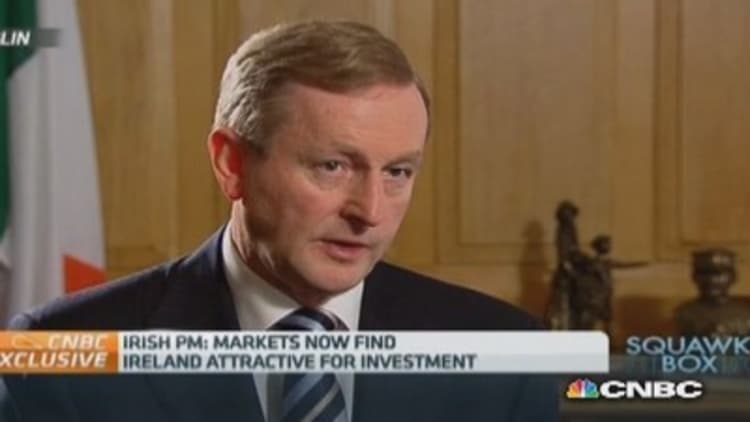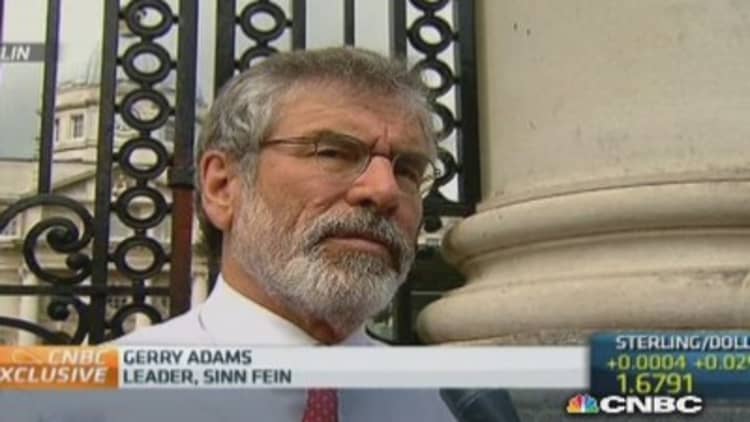Ireland's hard-fought exit from its bailout was won partly with relative political agreement. But now the country starts down the road to some economic stability, divisions between its politicians are widening.
The country's historically dominant political parties, Fianna Fail and Fine Gael, like many other large political parties in Europe, are feeling the threat of newer, populist parties ahead of an expected general election in 2015 or 2016. In this case it's Sinn Fein, once notorious for their connections with the paramilitary Irish Republican Army (IRA).
Read MoreIreland has 'paid the price' for austerity: Enda Kenny
Fianna Fail, the party of founder of modern Ireland Eamon de Valera, has already suffered at the ballot box after presiding over the ill-judged guarantee of Irish banks in 2008 – a measure that eventually forced the country into accepting a bailout.
Their successors in government, Fine Gael, may in turn see their voting base in upcoming European elections damaged by the austerity program imposed by international lenders. While Ireland is out of recession and bailout and the cost of repaying its debts is now lower than that of neighboring U.K., the average Irish person has not really felt the benefits yet.
Ireland's people seemed to be more accepting of austerity than their counterparts in Greece or Spain during the bailout process.

"The vast majority do not feel the joy, the confidence of the recovery," Taoiseach (Irish Prime Minister) Enda Kenny conceded in an interview with CNBC.
"And the reason they can't feel the joy of it now is because they've had to pay that price. So that's why government in terms of its tax flexibility and the continued growth of the economy want to be able to repay people for scale of challenge that they've had to deal with."
As Sinn Fein have emerged as an electoral force outside of Northern Ireland, the motivation among some in authority to undermine them has grown.
Read MoreIreland: Real recovery or all blarney?
Sinn Fein leader Gerry Adams was recently questioned about whether he had anything to do with one of the most notorious murders of the Troubles. Widow Jean McConville, whose death orphaned her 10 children, was shot more than four decades ago after being accused of being an informer.
In recent months, her children have come forward in interviews with the BBC to claim that they knew who killed their mother. A documentary on the "disappeared" – those who vanished during the course of the Troubles – late last year led to Kenny raising the issue in the Dail, Ireland's lower house of parliament.

Adams, who has always denied IRA membership despite the closeness between Sinn Fein and the IRA, argued that his arrest was politically timed in an interview with CNBC.
"My own view of all of this is it was as Martin McGuinness described, 'bad forces exploiting and seeking to stop the forward rise of Sinn Fein'," Adams said.
Sinn Fein, which is nominally left-leaning, has sold itself as on the side of the austerity-laden populace.
Read MoreIreland's credit rating: Second time lucky?
"The other parties are making their own choices, they are pro-austerity, they are loading ordinary people, working people, with huge debt from private banking, from greed and fortune and the financial system," Adams argued.
The ongoing trials of some of those accused of fraud in the lead-up to the crisis has not helped the Irish establishment's case. Last month, the trial of former executives at Anglo Irish Bank, whose troubles helped cause the crisis, on charges of illegally propping up its share price, ended with the judge refusing to jail two convicted men on the grounds that: "A State agency had led the two men into error and illegality."
An official inquiry into the banking crisis will begin this year.
Sean Fleming, Fianna Fail's spokesman on public expenditure and reform, defended the party's record. He told CNBC: "Who caused the banking crisis? Only the bankers and the boards of directors and chairpersons and chief executives. You might say regulators and other politicians do their bit, but they were issuing the bad loans and taking out bad investments."
Across the Irish Sea, there is also the prospect that the U.K.'s Conservative Party may need the support of the Democratic Unionist Party, founded by firebrand preacher Ian Paisley, in the event of a hung parliament after next year's U.K. election. The DUP have also led recent protests over the granting of immunity to republicans for crimes committed during the Troubles.
Prime Minister David Cameron hosted members of the DUP, whose leadership have expressed pro-creationist and anti-homosexual views, in Downing Street earlier in May. If the DUP are granted greater concessions as a result, there could be further polarization in Northern Ireland.


